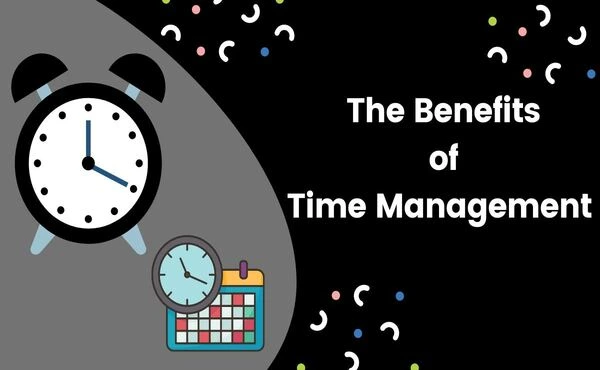
Time management is an important skill for teachers who must balance a number of activities every day, including planning and teaching, grading, and interacting with colleagues. Balancing these responsibilities without proper time management can be stressful, making it difficult to maintain a productive and stress-free workplace. Using tools like a school management system can assist teachers in organizing tasks more effectively and keeping track of important deadlines. This blog will look at why time management is so important for teachers, focusing on how it not only increases teacher productivity but also improves students' overall learning experiences.
Why Time Management is Important for Teachers

1.Improved Productivity and Efficiency
Time management for teachers is about not only getting more done, but doing so in a way that maximizes productivity while minimizing stress. When teachers organize tasks and plan their days, they may finish important work without compromising quality. Setting out specific time blocks for lesson planning and grading, for example, may help teachers in staying on top of work that would otherwise build up. Effective time management allows teachers to focus on high-impact activities such as creating engaging lesson plans and spending quality time with students. When teachers are organized and effective, the whole class benefits.
2.Reduced Stress and Avoiding Burnout
Teaching is a hard profession in which educators must continually balance multiple demands and expectations. Without proper time management, work can quickly grow, creating stress and even burnout. Teachers who manage their time effectively can develop a systematic approach to the day, reducing the stress of last-minute preparations and unexpected interruptions. Setting clear goals, organizing duties, and breaking down major projects into manageable pieces can help teachers feel more in control of their workload. Teachers who manage their time successfully are more relaxed, allowing them to concentrate on their students rather than stressing about impending deadlines.
3.Improved Student Results
One of the most important benefits of time management for teachers is its positive impact on student learning. Teachers who are well-organized and prepared can offer more effective and engaging classes. Students enjoy in a setting where their teacher is fully present and prepared to meet their needs. Time management enables teachers to deliver timely feedback, which is important for student performance. Teachers who manage their time well can spend more one-on-one time with students who need extra help, which boosts learning outcomes and maintains a supportive classroom environment.
Time Management Strategies for Teachers
Some practical methods may help teachers improve their time management skills. Here are some of the most efficient time-management practices in the classroom and more:
1. Analyze and Organize Tasks
Starting each day with a clear plan is one of the simplest and most successful methods to manage time. Teachers can guarantee that they are focusing on the most important activities by listing them in order of importance. Breaking down larger activities into smaller, more manageable parts minimizes stress and makes progress tracking easier. Checklists, planners, and digital task managers can help teachers organize and manage their days.
2.Set limits
Teachers often feel the need to go above and beyond for their students, which is admirable but can lead to burnout. Setting limits around work time is important to achieving a healthy work-life balance. For example, setting up specific hours for grading and planning and sticking to them can help keep school tasks from taking up personal time. Teachers can also create routines that indicate when the workday begins and finishes, making it easier to relax and prepare for the next day.
3.Use Planning Tools
Digital technologies useful for teachers who want to improve their time management. Teachers can use apps like Google Calendar, Trello, or Microsoft Teams to manage their days, create deadline reminders, and interact with colleagues. Planning tools speed up the scheduling process, allowing teachers to keep track of activities without becoming overloaded. Many teachers find that setting aside one day a week to organize upcoming lessons, assignments, and meetings helps maintain a smooth flow throughout the week.
4. Develop Efficient Grading Practices
Grading may be among the most time-consuming responsibilities for teachers. Teachers can save time and provide valuable feedback by designing an efficient grading system. Setting defined grading hours each week, using guidelines to speed up the assessment process, and adding external feedback where applicable are some of the ways. Grading efficiently helps teachers to concentrate on other important responsibilities while avoiding the buildup of uncorrected assignments.
5.Plan Breaks and Time for Reflection
Teaching is a difficult profession that requires ongoing energy and focus, therefore teachers must arrange breaks. Even little pauses during the day may help you focus to avoid tiredness. Taking a few minutes away from responsibilities allows teachers to return refreshed and focused. Furthermore, setting aside time to reflect on what works and what could be improved in time management allows teachers to change their strategies to be even more effective in the future.
Benefits of Time Management

Time management for teachers has benefits that go past simply checking tasks off a to-do list. Teachers who efficiently manage their time experience the following:
Increased job satisfaction: Teachers who feel in control of their time love their jobs more. This happiness transfers to their students, creating a happier classroom environment.
Better work-life balance: Effective time management allows teachers to fulfill responsibilities without spending personal time, which helps to minimize burnout.
More options for professional growth: When teachers can successfully manage their workload, they have more time to spend in professional development, which helps them improve their skills and knowledge.
Enhanced classroom atmosphere: Students feel the impact of a well-prepared, calm, and focused teacher. When teachers manage their time, they create a stable and supportive learning environment that benefits all students.
Conclusion
In the world of education, where every moment counts, time management is a vital skill for teachers. Teachers who manage their time well can accomplish more, provide better support to their students, and maintain a healthy work-life balance. Time management is more than just completing things effectively; it is also about developing a disciplined approach that allows teachers to achieve in their roles without overloading them.
Effective time management for teachers results in a classroom that promotes learning, a teacher who is satisfied and motivated, and students who benefit from a well-organized and helpful atmosphere. If you want learn relationships between teachers and students, Check out our blog The Importance of Strong Relationships Between Teachers & Students